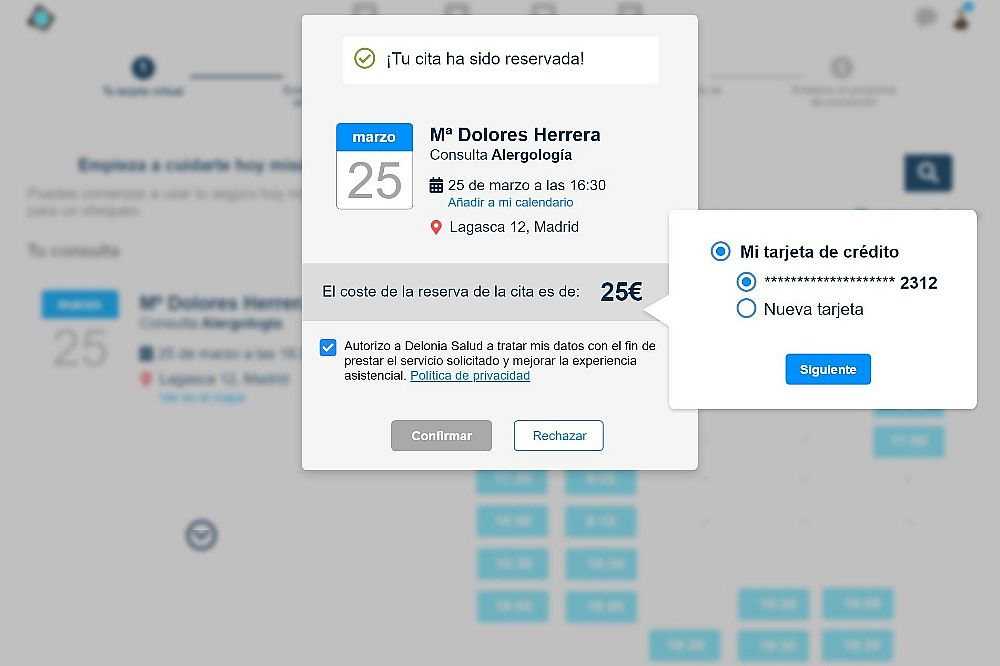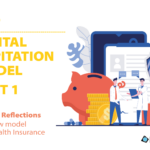Advance payment for services
Asking a patient to prepay all or part of the service or consultation at the time of booking is an unusual practice in the private healthcare system, but it is an option available to medical professionals and centres. Advance payment is common in some sectors or services. For example, it is common to pay an advance payment before buying a car or ordering a custom-made piece of furniture. In these cases, either the amounts involved are high or the service provider has to bear a prior cost, e.g. to prepare the brackets for an orthodontic appliance before fitting it. But this practice is also becoming more widespread in the catering sector, where there is a significant need to maximise capacity and where non-attendance has a major impact on turnover.

Prepayment is intended to guarantee payment to the provider and therefore makes sense if there is a risk that the client does not want the service he/she has requested and does not pay for it. In the booking of health services, if the customer makes an appointment for a consultation or health service and does not attend or cancel the appointment, does the health professional suffer a financial loss if he has not had to incur a prior expense? Of course, it incurs an expense. There is a loss of income, because that consultation is not held and is not paid for and because that space of time cannot be used to care for another patient. It is not a minor problem in the health sector where, especially in recent times, waiting lists are long and getting an appointment with the professional you are interested in is not easy. In addition, this risk has increased with video consultation services where the patient may not attend and may even connect and subsequently not pay for the service.
In this context, several questions can be asked:
Why don’t patients come to a booked appointment?
Sometimes unforeseen events arise that force the client’s plans to change, and it is not always easy to contact the clinic or medical professional to cancel the appointment. If the client took a long time to book the appointment, they may not bother to cancel it. There are also clients who forget the appointment because they booked it a long time ago. One of the consequences of the saturation of the system is that appointments must be booked so far in advance that they are more likely to be forgotten or become unnecessary. Certain cultural aspects also play a role by not considering the inconvenience and financial loss of not attending a booked appointment.
What are the problems caused by non-attendance at booked appointments?
The loss of income for the professional due to the cost of the dead hours, which will end up having an impact on the quality of care and increasing waiting lists. In addition, the absence of patients without warning can be mitigated by “over-booking”, i.e., partially overlapping patients in the knowledge that a percentage of them will not attend. It is a kind of overbooking qthat guarantees that the professional will not have any downtime. The big problem with this solution is that it deteriorates the service to the patient, as it is not possible to respect the appointment times.
What can be done to ensure that patients keep their appointments?
Ask the client at the time of booking for full or partial payment of the service. In this way, the patient will attend or, if unable to do so, will try to cancel the consultation in time to recover their payment. Also, the doctor’s schedule will be more accurate, and patients will not have to wait unnecessarily. If an online appointment system is also used, the professional will have total control of the activity and communication with the patient, which will make it easier for the patient to attend or cancel on time.
What difficulties are there in implementing prepaid models?
- It is not yet common practice and the health centre or professional fears that it would be a deterrent to make the client pay and that he/she would not go to them but to a competitor if he/she had to pay an advance payment. In fact, professionals with very high demand who will not be penalised by this practice already use the prepayment model.
- Because the prepayment process is complex and requires time-consuming manual follow-up work without a suitable software support solution.

Advantages of the Delonia online appointment and prepayment solution
The ideal way to address these two difficulties is for healthcare professionals to have an online solution that allows them to implement an advance payment model that is modular and adapted to their needs. The important thing is that it can be implemented selectively and, for example, that it can charge in advance for those services that cost more or are in greater demand, but not for others, ensuring the correct provision of the service where there is a greater risk of loss. The objective is to make life easier for the client and easy to manage for the professional so that the advantages for doctors and patients allow the model to be consolidated. This solution should facilitate that:
- The client can book an appointment through any channel, online, in person or by telephone, and that advance payment is facilitated.
- The professional can autonomously configure the type of charge he/she wants to make, for the complete service, an advance payment of only a part or adjust the charge to the type of service with different amounts or percentages.
- The system issues the appropriate billing for the patient, adapted to the corresponding accounting and tax treatment.
- The system has a cancellation fthat is easy to use for the patient and modular for the professional: set the cancellation deadline without penalty, send automatic messages about the appointment, etc.
- There is an automated communication, notification and reminder system that is adaptable to the content and messages that the professional wants to give.
- The system facilitates that cancelled appointment times can be filled by communicating that vacancy to patients who have requested an appointment and have it later, with an appropriate and automatic waiting list option.
- If the professional provides video-consultation services, these may have a special treatment in the system, for example, by programming that the advance payment in these cases is not a percentage but total.
- A discount could be incorporated in the case of prepayment, to encourage early payment of the service and to positively motivate the patient to use it.
Delonia’s online appointment system has these functionalities and is a solution that can contribute to making the actual healthcare work easier by relieving the professional of administrative burdens. Its flexibility makes it possible to adapt to the appointment and payment process in each situation, thus minimizing the negative impact on clients.
Delonia Online Appointment and Prepaid Solution Features






